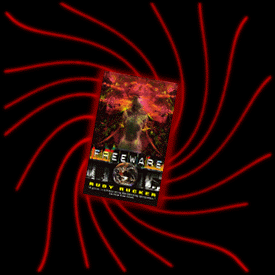 While Rucker was in high-school, his father became ordained as an Episcopal priest, and worked as parish priest for the rest of his life. Rucker went to college at Swarthmore. "I had a lot of fun there, and was sorry to graduate," he recalls, "but my choices were the draft or grad school, so I had no hesitation in going to Rutgers University. I got my Master's and Ph.D. in Mathematics. My area of specialization was Mathematical Logic, with my thesis on Transfinite Set Theory. In 1967, I married my college sweetheart, Sylvia Bogsch, and not too long after that we had our three children: Georgia, Rudy, Jr., and Isabel."
While Rucker was in high-school, his father became ordained as an Episcopal priest, and worked as parish priest for the rest of his life. Rucker went to college at Swarthmore. "I had a lot of fun there, and was sorry to graduate," he recalls, "but my choices were the draft or grad school, so I had no hesitation in going to Rutgers University. I got my Master's and Ph.D. in Mathematics. My area of specialization was Mathematical Logic, with my thesis on Transfinite Set Theory. In 1967, I married my college sweetheart, Sylvia Bogsch, and not too long after that we had our three children: Georgia, Rudy, Jr., and Isabel."
For his first job at the State University College at Geneseo, New York, Rucker transformed the "Higher Geometry" course into a series of lectures on the fourth dimension. Eventually he wrote the lectures up as Geometry, Relativity and the Fourth Dimension, "and managed to get them published by Dover Publications, a house which primarily publishes public-domain books by dead authors. They didn't pay me much," he says, "but it was enough to throw myself a good thirtieth birthday party --- and my writing career was on its way." In 1976 Rucker wrote Spacetime Donuts. "I wasn't sure I could write a novel, but I just kept going and after awhile it was done."
In 1978 Rucker got a grant from the Alexander von Humboldt Foundation, funded by the German government, and the Rucker family lived in Heidelberg for two years, where he wrote most of Infinity and the Mind as well as two novels: White Light and Software. "I was really a writer," he says. The Ruckers moved to Lynchburg, Virginia, the home of then-prominent Jerry Falwell. Rudy decided to give full-time writing a try, and in the years between 1982 and 1986 he wrote six books. "This period marked the birth of cyberpunk science-fiction," he says, "and I became recognized as a founding father of the movement. My cyberpunk novels Software and Wetware each won a Philip K. Dick Award for best paperback SF novel of the year.
"As my own alternative to cyberpunk," he continues, "I also developed a style of writing I call transrealism. The essence of transrealism is to write about one's real life in fantastic terms. The Secret of Life, White Light, and The Sex Sphere are examples of my transreal novels. The first recasts a traditional coming of age memoir as a UFO novel, the second is about my time as a mystical mathematician in Geneseo, while the third turns my two years in Germany into a tale of higher dimensions and nuclear terrorism." In Lynchburg, Rucker wrote Mind Tools, a nonfiction book about mathematics and information, which rekindled the desire to teach math again. "When an old friend told me about a job opening at San Jose State University, I applied for it, and to my delight I was hired in 1986 and am still there.
"When I started my job in the SJSU Department of Mathematics and Computer Science," he continues, "I was urged to consider teaching computer science as well as math. I did not know a great deal about computer science at the time (understatement!), although my doctoral work in mathematical logic had certainly familiarized me with theoretical computing. The first computer science course I was assigned was anything but theoretical: it was Intel chip assembly language! Rucker soon found something he was interested in programming: cellular automata -- parallel programs that produce rapid-fire self-generating computer graphics animations. "As well as teaching me a lot about computer science, my interest in cellular automata led to a very interesting part-time job during the years 1988-1992," Rucker says. This was with Autodesk, Inc., of Sausalito, California, makers of the popular AutoCAD program. It seemed the co-founder and then-chairman of Autodesk was fascinated by cellular automata. "After I met Walker at the Hackers 2.0 conference in 1987, he hired me to work on some cellular automata software with him. I worked on three shipped products at Autodesk: Rudy Rucker's Cellular Automata Laboratory, James Gleick's Chaos, and Artificial Life Lab. My transreal novel The Hacker and the Ants was heavily influenced by having worked inside a Silicon Valley software company."
These days Rucker is back to his main interests: teaching and writing. "I seem to spend an awful lot of time hacking Windows C++ graphics programs for my software engineering classes," he admits. "My most recently completed manuscript is a transreal work called Saucer Wisdom. The book recounts my experiences with a UFO contactee named Frank Shook. The saucers purportedly showed Frank Shook many bits of Earth's future -- up through the year 4004!" Rucker is also engaged in writing up his software engineering lecture notes for a textbook and CD with the title The Joy of Hacking. "I plan for the CD to include the full source and executables for my previously published cellular automata, chaos, and artificial life programs." Another current project is an anthology of his stories and essays from the 1990s, with the title Gnarly! Writings from Silicon Valley.
|

